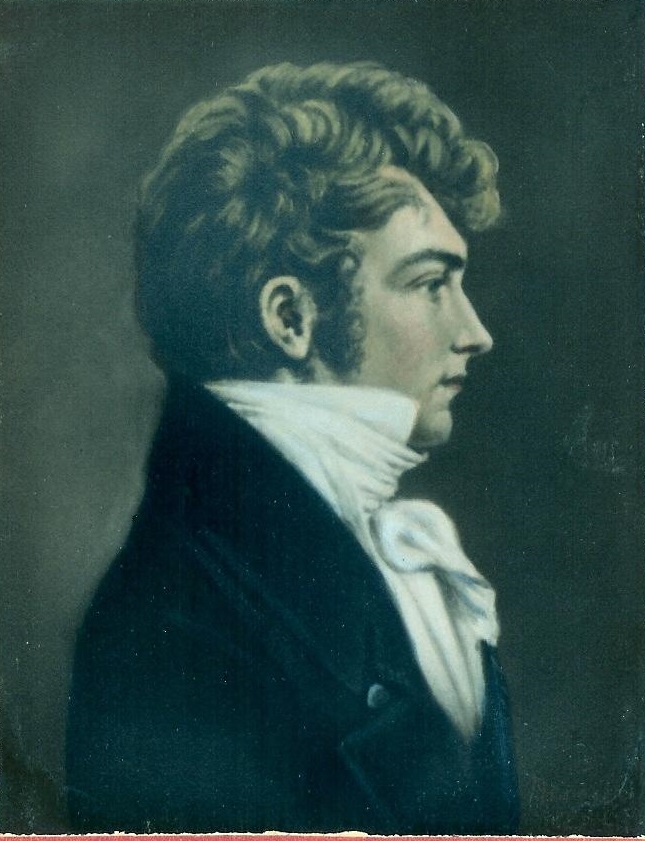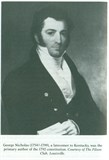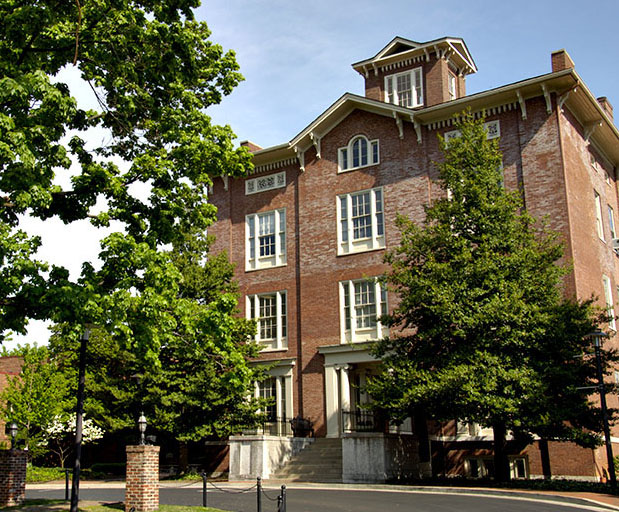Ni6 Col. George Nicholas II
was the son of Robert Carter Nicholas (Ni7) and Ann Cary Ca7| Born: 1753/5 in Hanover County (?), Virginia .Colonel George
Nicholas II (Ni6) was born on 11 August in Virginia either in Hanover County
or in Williamsburg.
Died: 25 July 1799 in Lexington, Kentucky. A stroke may be suspected as cause of death  
Miarried to Mary Smith Sm6, sister of General Samuel Smith of Baltimore, Maryland, who also married a sister of George Nicholas Ni6 and Wilson Cary Nicholas Ni6.2, the latter married a sister of Mary Smith Sm6. so the children of each of these marriages were all double cousins of children of the other. |
As a direct male descendant of the Nicholas Families of Alcannings
and Roundway he was entitled to bear the Nicholas Coat of Arms, as were
his sons and theirs etc.
Nicholas of Roundway |
|
George Nicholas and Mary Smith had the following children:
A key provision of the Kentucky Resolutions was Resolution 2, that denied Congress more than a few penal powers: That the Constitution of the United States, having delegated to Congress a power to punish treason, counterfeiting the securities and current coin of the United States, piracies, and felonies committed on the high seas, and offenses against the law of nations, and no other crimes, whatsoever; and it being true as a general principle, and one of the amendments to the Constitution having also declared, that "the powers not delegated to the United States by the Constitution, not prohibited by it to the States, are reserved to the States respectively, or to the people," therefore the act of Congress, passed on the 14th day of July, 1798, and intituled "An Act in addition to the act intituled An Act for the punishment of certain crimes against the United States," as also the act passed by them on the -- day of June, 1798, intituled "An Act to punish frauds committed on the bank of the United States," (and all their other acts which assume to create, define, or punish crimes, other than those so enumerated in the Constitution,) are altogether void, and of no force; and that the power to create, define, and punish such other crimes is reserved, and, of right, appertains solely and exclusively to the respective States, each within its own territory. He graduated at William and Mary College in 1772. At the beginning of Oct. 1775 he was commissioned to command a company of virginia troops in the Revolutionary War. There is a letter in the correspondence of Thomas Jefferson from Archibald Cary dated 31 Oct. 1775 saying: "...This Week past hosilitys Commenc'd in this Colony, by an Attack from the Navy on Hampton. Our Young Treasurer aided by Capt. Lynn behaved like Heroes of Old, but the Papers will Give you the Affaire at Large. ..." (Robert Carter Nicholas had long been called "The Old Treasurer" by his friends and colleagues, Archibald was his wife's cousin, plantation owner, Burgess and one of leading botanists of his day.) |
The Bourbon iron furnace went online (blast) in 1790, and in May 1791, was purchased by John Cockey Owings and Company, a joint stock company, which included Owings, Greenup, Walter Beall and Willis Green. In 1794 additional partners were added, to include George Thomas, John Breckenridge, and George Nicholas. In 1795 John Cockey Owings emerged as sole owner.
When a young officer during the Revolutionary War George Nicholas met Mary Smith (Sm6) at a ball in Baltimore, and later married her. After resigning his commission he practiced law in Charlottesville, Albemarle County, Virginia, was a member of the Virginia legislature from Albemarle County. and became a leading member of the Virginia Convetion assembled for the consideration and adoption of the constitution of the federal Union, He served as Captain and Major of the Second Virginia Regiment in 1777, and was made Colonel. He resigned after serving for two years. George Nicholas (Ni6) was a member of the Virginia Convention that ratified the Federal Constitution. His speeches are recorded in Eliott' s Debates. He was a member of the Virginia House of Assembly and a Burgess. In Wood's History of Albemarle, page 384, Appendix 7, George and Mary (Smith) Nicholas are listed as emigrants from Albemarle to other States. This was in 1790, when he moved Kentucky. He there became the first Attorney-General of Kentucky, and was a member of the first Constitutional Convention at Danville in 1792. In “Kentucky Lawyers and Lawmakers” on page 24, it says, "a manuscript copy of this instrument (the first constitution) with corrections and notes in his own difficult chirography, still in existence corroborates the statement that he was the author of the Constitution of Kentucky.”¬ “He was “the most active person compiling the sections of the constitution, which included many ideas developed in the Danville Political Club before his arrival in Kentucky (Kerr, Hist. of Kentucky, I pg 284; Durrett MS Collection)” George Nicholas (Ni6) established the Law Department at Transylvania University, Lexington, Kentucky and was its first Professor of Law. He lived between Lexington and Danville, and also in
“In July 1798 there was a gathering to discuss the Alien and Sedition
Laws. Nicholas spoke out against them denouncing their anti-constitutional
character, in the tumult that followed Henry Clay was called and his eloquent
denunciation of the Federalist suppression so captivated the public that
both were hoisted on the shoulder of the crowd and borne away as the heroes
of the day (Kerr, History of Kentucky, I,pg. 410, Warfield, Ky. Res. Of
1798, Prentice, Biog. Of H. Clay)”
His obituary, published by John F. Bradford in the Kentucky Gazette,
August 1, 1799, follows: "Departed this life, on the 25th ult. at his seat
in this town, Colonel George Nicholas, Professor of Law and Politics in
the
|
Sources: Mrs. George Nicholas (Ni3-5)
"The late Judge Nicholas of kentucky" by Paul Shipman, printed in Lippincott's
Magazine for January 1878, copy received from the Filson Club in Louisville
Birth - Various Virginia Historical Magazines
Marriage -
Death - Kentucky Gazette, August I, 1799. Published at
Lexington, Kentucky by John F. Bradford.
A copy of a will, assembled by testimony of witnesses or friends, from
their recollection of the terms of the original, destroyed by fire in the
Fayette County Court House, Kentucky, was probated and used by the Court.
http://virtualology.com/virtualmuseumofhistory/
Appendix to Page (Ni6)
Descendants of Colonel George Nicholas (Ni6)
Colonel Nicholas' sons all died unmarried, except the youngest, Samuel Smith Nicholas (Ni5).
Among his sons, Robert Carter Nicholas (Ni5.1) the eldest, was a U. S. Army Officer, as was George Wilson Nicholas (5.6).
In Lippincott's Magazine, January 1878, page 79, there
is an article on Judge Samuel Smith Nicholas. Mr. Paul Shipman says
that Robert Carter Nicholas (Ni5-1) was reputed the most brilliant talker
of his day, his conversation always attracting a throng around him in public
places.
Another son, John Nelson Nicholas (Ni5-9) established in 1825 the “Kentucky
Whig”, a Lexington, Kentucky, newspaper. He was said to be one of the ablest
political writers in the state. This newspaper was discontinued in l826
after the death of its editor. His will is dated March 25, 1826.
In reference to John Nelson Nicholas a paper in the possession
of Mrs. George Nicholas (Ni3-5) is quoted:¬
John Nelson J. Nicholas Editor Kentucky Whig.
Died August 14, 1826 Died .August 16, 1826
Duel, statement of' Judge Samuel Nelson of Lexington, Kentucky
to Mr. Lee Hawes, of Cincinnati, Ohio, a descendant of Colonel Nicholas
(Ni6). Corroborated by a Lexington man.
--Buried in Orchard of Trotters near Lexington. James G. Trotter was
the husband of Elizabeth Randolph Nicholas (Ni5.10), Nelson's sister.
Reference to tragedy in family letters. Statement of Mr. Lee Hawes August 28, 1933, to Mrs. George Nicholas (Ni3.4)
By tradition, this duel was said to have been with a member
of the Breckenridge family, due to the dispute over the authorship of the
Resolutions of l798. There were counter-claims by each family. A letter
from Thomas Jefferson to a son of Breckenridge confirms that the latter
was given 5 of the Resolutions drafted by Jefferson and added the last
two himself (Kerr, Hist. of Ky, I).
All of the daughters of Colonel Nicholas married and are reputed
to have had descendents, but Mrs. George Nicholas (Ni3.4) believed that
Margaretta¬ (Ni5-8) first married Col. Bartlett and second Gen. Fletcher
and left no descendents. Senator Hawes (deceased) of West Virginia, descended
from Hetty Morrison Nicholas (Ni5.13).
There is a portrait of Margaretta Gabraith Nicholas (Ni5.8) listed
in Jouett's collection as the “Portrait of Mrs. Fletcher owned by Colonel
Charles Parsons Nicholas (Ni3-5-4), in the residence of his mother,
Mrs. George Nicholas (Ni3-5) in 1948. 25 years later General Nicholas sent
the author a picture of his wife and himself standing in front of this
portrait.
There is an engraving of Colonel George Nicholas, by St. Memin, at the Corcoran Art Gallery in Washington, D. C. and the Same engraving in color in the New York Public Library, in the MSS. room.
The Filson Club of Louisville, Kentucky has a letter from Isaac Shelby, first Governor of Kentucky to Colonel George Nicholas, lent by Mrs. George Nicholas (Ni3-5).
A silver watch, bought in London probably by Dr. George Nicholas (Ni8), grandfather of George Nicholas (Ni6), and a few other relics are owned by the family of Miss Charcilla Mason in Texas. Her family is descended from Maria Nicholas (Ni5-2)
Charcilla Mason sent a small portion of a Marseilles bed spread, belonging to Colonel George Nicholas' wife, Mary Smith (Sm6) to Mrs. George Nicholas (Ni3.4). She also sent copies of the silhouettes of Robert Carter Nicholas (Ni7.1) father of Colonel George Nicholas (Ni6), and of the Colonel, to George Nicholas (Ni3-5). These were owned by Mrs. George Nicholas (3-5) in 1948.
George Nicholas is shown on the payroll of the 2nd Va. Regiment as a
major in April 1777 http://rhodesfamily.org/wm/j-q.htm.
http://www.usdoj.gov/usao/kyw/history/index.html
In 1789 Kentucky was not a state, but was instead a frontier portion of Virginia. Nevertheless, Congress decided to place one of the original thirteen district courts here. Although far from the busy coastal colonies, the Kentucky wilderness was growing rapidly with a variety of hardy settlers and adventurers, ex-soldiers, and land speculators. On September 29, 1789, George Washington appointed Colonel George Nicholas to serve as the first United States Attorney in Kentucky. Born in Virginia, Nicholas had been a Captain in the Virginia line during the Revolution. Before settling in Kentucky, he had been an influential member of the Virginia convention called to ratify the federal Constitution. Nicholas, "the brightest luminary" of the Convention, has been called the "Father of the Kentucky Constitution." In 1799, Nicholas became the first Professor of Law at Transylvania College, the first college west of the Allegheny Mountains.
